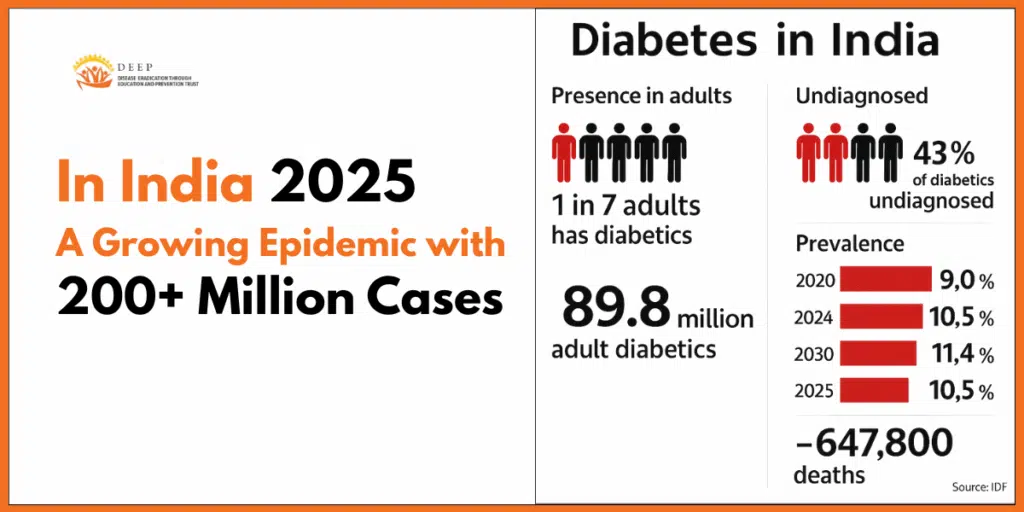Diabetes in India 2025: A Growing Epidemic with 200+ Million Cases

Diabetes in India 2025: A Growing Epidemic with 200+ Million Cases India’s Diabetes Landscape: The Latest Numbers from 2025 As per the International Diabetes Federation (IDF) Diabetes Atlas 11th Edition (published April 2025), approximately 89.8 million Indian adults aged 20–79 were diagnosed with diabetes in 2024—that’s one in seven adults worldwide and a 10.5% prevalence rate—making India the country with the second-largest number of cases globally, behind China. Alarmingly, 43% of these individuals—nearly 38.6 million Indians—were unaware of their condition. Medical Dialogues Meanwhile, a groundbreaking study by The Lancet and NCD‑RisC estimated that in 2022, over 212 million adults in India were living with diabetes, accounting for a staggering one‑quarter of global cases . Nearly 62% of these cases were untreated. India Today Together, these sources paint a worrying trend: India may have crossed the 100‑million threshold for diagnosed and undiagnosed cases by late 2023 or early 2024, with figures continuing to rise. DD News A Silent Epidemic No One Saw Coming What used to be deemed a disease of older adults now spans all demographics—from teenagers to rural families. Diabetes develops gradually—fatigue, frequent urination, increased thirst, or weight shifts often go unnoticed. By the time symptoms are acknowledged, complications may already be setting in. With 43% undiagnosed, lack of awareness and delayed testing continue to drive this crisis. Medical Dialogues The Real Numbers: What They Tell Us Metric Estimate (India, circa 2022–24) Adults with diabetes (IDF data, 2024) ~89.8 million adults (10.5% aged 20–79) Adults estimated in Lancet study (2022) ~212 million adults with diabetes (incl. diagnosed and undiagnosed) Undiagnosed rate ~43% or 38.6 million (IDF) Untreated (not on medication) ~62% of all diabetics (Lancet) Projected rise by 2050 ~156.7 million diabetic adults (IDF projection) This upward trend highlights an urgent need for intervention: India faces a public health burden rapidly outpacing projections. Why Diabetes Is Spreading So Fast in India Unhealthy Eating Habits Many diets are high in sugar, deep-fried foods, and low in fiber. Fast food, sweetened beverages, and late-night meals have become common. Sedentary Lifestyle Long hours spent sitting—whether at desks, in vehicles, or with screens—combined with little to no physical activity are contributing factors. Lack of Awareness and Testing Most people do not go for regular blood sugar checks. Early warning signs are ignored or misunderstood. In rural areas, basic testing is often unavailable. High Stress and Urban Pressure Chronic stress, poor sleep, and unbalanced work-life routines increase the risk of diabetes and make it harder to manage blood sugar levels. What Needs to Change Start Health Education Early Begin awareness in schools and colleges. Parents should be educated on the early signs of diabetes and how to promote healthier habits at home. Make Sugar Testing Easy and Accessible Set up regular blood sugar screening camps in offices, schools, and neighborhoods. Use mobile testing vans to reach remote areas. Promote Preventive Lifestyles Encourage walking, yoga, and screen-free time. Teach people how to prepare healthier meals and manage stress in daily life. How DEEP Trust Is Taking Action To respond to this growing crisis, DEEP Trust has launched targeted programs focusing on diabetes awareness, testing, and lifestyle change. Project Mobile Health Operating in states like Andhra Pradesh and Telangana,mobile health camps offer free blood sugar testing, blood pressure checks, and counseling. Trained professionals guide people on preventive care. Youth Wellness Camps Held in schools, colleges, and local communities, these camps include health screenings and education sessions focused on stress, diet, and early detection. So far, over 40,000 individuals have benefited from these initiatives. What You Can Do to Prevent Diabetes Get your blood sugar tested once a year Choose natural sugars like fruits over processed sweets Walk for at least 30 minutes every day Limit screen time, especially before bed Talk to a doctor if you experience persistent thirst, fatigue, or unexplained weight changes A Final Word: The Time to Act Is Now Diabetes is one of the most preventable chronic diseases—but only if we act early. Regular testing, simple lifestyle changes, and better awareness can stop this silent epidemic from spreading further. At DEEP Trust, we are working to change the future by reaching more people with knowledge and support. But we cannot do it alone. Share this blog with your school, workplace, or community Invite DEEP Trust to organize a screening camp in your area Support health awareness programs that save lives Let us work together to ensure India is known not for its diabetes crisis—but for how it overcame it. 👉 Donate Now — Your Support Could Save a Life
